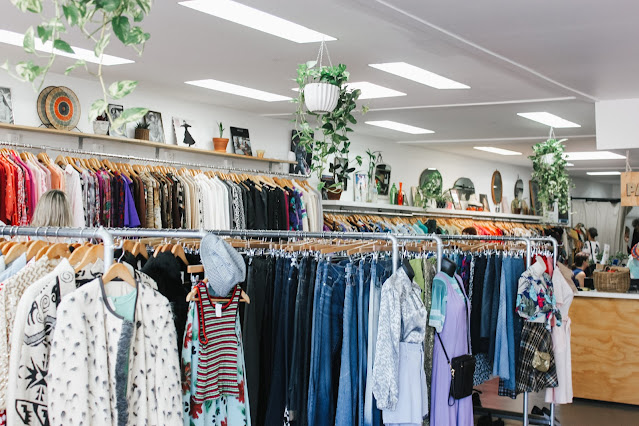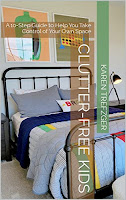Decluttering Guilt: When You Feel It, There's Only One Right Response
And that's great. What's left is hopefully the stuff you use and love – each item with a place to belong, easy to access and put away again. Your home is more spacious, organized, peaceful, and beautiful.
Yes, cleaning out and donating made you feel pretty good. At least until you read statistics like this one:
While you may donate your old clothing to charity,
the truth is, even then, a whopping 84 percent of our clothing
ends up in landfills and incinerators.
We want to declutter, but selling our items can take a lot of time and effort (and doesn't always net as much money as we hope), yet donating isn't a sure bet either. And we wind up with a lot of guilt about our stuff, and worry about how much waste we're adding to an already gigantic garbage situation.
How can we handle our regret? Do we stop decluttering? Just keep all of our stuff? Die and let our kids or grandkids worry about it?
No no no.
Here's the truth. This problem – clutter, waste, environmental degradation – it's our fault.
Sorry, but it's on us. (I'm talking to myself too.)
- Who used and abused Amazon Prime membership? We did.
- Who shopped Target clearance endcaps once too often? Us again.
- Who turned visiting the Dollar Store or garage sales into a weekly habit? You guessed it.
- Who buys lots of cheap clothes because they're cute and we want a pick-me-up? You know who.
- Who can't resist Hobby Lobby's new seasonal décor? Guilty as charged.
Dropping our unwanted clutter at the local charity shop is a quick fix for our greedy habits. However, "... a whopping 84 percent of our clothing ends up in landfills and incinerators." That's right – 84% of our cast-off clothing isn't wanted by anyone else. Who knows what percentage of our other donations aren't wanted either?
You've seen WALL-E, right? I don't think it's a fairy tale.
So the only right thing to do is change our buying habits.
We can purge all we want from our homes, but if we don't become more thoughtful, intentional consumers, we'll wind up right back where we started – and our trash will take over the planet.
10 minimalist buying habits the world needs now
1. Buy less.
There's a reason we all have so much clutter – we simply buy too much. In this era of shrinking family sizes and ballooning home sizes, millions of people are still overwhelmed with clutter and complain about lack of space. Millions of people live paycheck to paycheck and carry large amounts of credit card debt. Really, this has to stop.
2. Try a Buy Nothing challenge.
A stop-shopping challenge puts a freeze on our typical behavior. Don't buy anything except food and gas for 30 days, and see what you learn about your shopping habits, triggers, impulses, and more.
A few of you have asked for an update on my Buy Nothing Year. I've decided to continue the same program in 2023, and plan to reduce my Starbucks dependency even more.
- Jon and I saved almost 16% of our income in addition to regular retirement contributions.
- We were able to nearly double our usual monetary gifts to charity.
- We only had one box of things to donate at the end of the year.
- I became much more selective about purchases.
- I found plenty of ways to entertain myself without shopping.
- I dealt with temptation – usually successfully but sometimes not – and I always came back to my resolutions.
We all have our trigger stores – the ones that make it very difficult to resist buying. You know that stores and websites are designed to keep you there longer and increase your spending, right?
So if Target is your trigger store, buy your milk and Cheerios at a regular grocery. If you must go there for some reason, leave your credit card at home and take limited cash. It's much harder to overspend if you don't have the means.
4. Unsubscribe from store e-mails.
How often have you gone shopping just so you could use a coupon or take advantage of a sale you didn't even know about until the store e-mail showed up in your inbox? (I've certainly done it.) Those sales and coupons don't exist to help you save money – they're intended to make you spend money. They're not for your benefit. They're straight-up marketing tools which benefit the store.
5. Stop reading magazines.
Magazines are basically gigantic advertisements – not just the ad pages, but every single article. Whether it's fashion, home goods, tech devices, or whatever your interest, those publications exist to make money, and they make money by selling to you.
6. Take a break from social media.
Social media can be a useful tool to help us keep in touch with family and friends. But it's also a source of comparison and discontent. Pinterest, Instagram, and the rest are carefully curated platforms that foster desire. Ignore them for a while (try 30 days) and see how it impacts your shopping habits.
7. Figure out what you're really looking for.
- boredom
- loneliness
- inferiority
- lack of purpose
- ... or something else?
When you stop shopping for a period of time, you need to let yourself feel whatever it is that impels you to shop. Then you'll be able to deal with those feelings in a healthier way.
8. Cultivate gratitude.
Gratitude is the antidote to consumerism, but it's not our default behavior. However, if you're interested in decluttering, you obviously have more than enough stuff. You're already blessed, and you need to realize that.
Start by making a list of things you appreciate, and keep adding to it. If this is new for you, or you've been going through some trying times, start small. Food. Water. Health (or if your health is compromised, give thanks for medical care). A place to live. The ability to read and write. Adding to the list will get easier and more rewarding as you dig deeper.
9. Replace shopping with other activities.
Let your shopping triggers prompt healthier behaviors. When you think, "I should go shopping," choose another pastime.
- Get outside for a walk, especially if there's a park or a garden nearby.
- Read a book.
- Call a friend or family member.
- Take time for self-care. Soak in the tub, give yourself a manicure, tweeze and shape your eyebrows, etc.
- Make a cup of tea or coffee and sit quietly with it.
- Take a nap.
- Play a board game with your kids. Or build with Lego, or color a picture.
- Bake muffins or cookies or whatever you have ingredients for.
- Take care of an item on your to-do list.
- Declutter a drawer, shelf, or closet. Notice how much you already have.
Most of us have a list – not necessarily written down – of things we desire. Call it a bucket list, a dream list, or whatever you want, but it includes an ever-growing number of things we think we need for a happy life.
This list is nurtured by ads, fads, and envy. It never stops growing. I suppose it's the human condition to always want what we don't have. (Isn't that what got Adam and Eve into trouble?) But this tendency makes us dissatisfied with our lot and blind to the good things we already possess. We become covetous and ungrateful.
Maybe these aspirations give us goals and a purpose, but they also trap us in the rat race of work, spend, work, spend, pay, and keep on paying just to keep our heads above water.
I think we can harness the list-making habit and turn it on its head. Let's make lists of what we don't need.
When I did this, my list included a fancy coffee maker, a George Foreman grill, and specialty baking pans. It mentioned a larger TV, security cameras, and a smart speaker. I added a designer handbag, couture shoes, and jewelry. New bedroom furniture, a new sofa, and quartz countertops. Also trips to Tahiti and New Zealand, season tickets to pro sports games, and a luxury car. I could go on.
Walk around your house and make a detailed list of what you don't need to add to your life. Then when you have an impulse to shop out of boredom, stress, or the feeling that you're lacking something to make you feel happy and complete, you can pull out your list and remember everything you don't need or want. Let whatever feeling is prompting you to add something new to your home and life turn into gratitude for how much you already have.
And by the way, is acquiring more stuff really a worthy purpose for your life?
The value of guilt
Decluttering guilt is no fun, but if it pushes us to change our behavior, it's worth it. The best possible result is that we become more thoughtful, intentional consumers. We choose quality items we need, budget for them, take care of them, and use them for a long time with satisfaction.
It's how to shop with no regrets.
Related article: What Do You Do With All of Your Stuff?
You'll appreciate my newest book, Clutter-Free Kids: A 10-Step Guide to Help You Take Control of Your Own Space. Get a copy for a child or a family you love today.








Another great article, Karen. I need these constant reminders. The struggle to stop unnecessary shopping is real. Thank you!
ReplyDeleteHi, and thanks for your comment. The struggle IS real -- habits aren't developed overnight, and they aren't changed overnight. Keep coming back to your new intentions. In my experience, the compulsion to shop really will get less. Good luck!
DeleteAgree, this article is excellent. I also need frequent reminders to counter the incessant pull of our consumer culture. Thanks for the great content. I’m saving this one.
ReplyDeleteGlad you found it helpful!
DeleteWow! Considering that unnecessary purchases could reflect a feeling of inferiority... quite a revelation, thank you always Karen.
ReplyDeleteYou're so welcome, Ale!
Delete